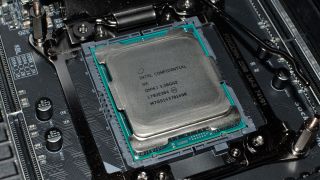The Highs

Samuel Roberts: NEXT-COM
This week I interviewed X-Com creator Julian Gollop about Phoenix Point, his return to the turn-based strategy genre. It's shaping up to be a treat for those who want more of that kind of game after knocking through War of the Chosen, with a totally different approach to the strategic layer.
It borrows more from Civ in that way than anything else, and I can't wait to get hands-on with it next year.
Joe Donnelly: Divine itemisation
As you might have noticed, Larian's massive fantasy role-player Divinity: Original Sin 2 launched this week and Fraser really liked it. I didn't play the first game, much to my shame, however managed to squeeze in a few hours with the sequel over the last few days. And my goodness, it's good. To the point where I've found myself idly pondering things in my spare time like: 'what if I combined this item with that?' or 'what if I spoke to her about him, and then did this?' or even 'what if I sliced off his face, used it as a mask and snuck in there?'
I've been at it all week—cycling my inventory in my head and evaluating which items might help me complete certain tasks or beat certain battles. Which is of course testament to the scope of the game. I understand the same applied to the original, but I feel right at home here despite having missed out the first time round. So much so that Divinity: Original Sin 2 is very possibly, already, my game of the year.
Jody Macgregor: My high is elves
When I was a kid playing Warhammer Fantasy Battles the High Elves were my first army. (There were 40 plastic elves in the fourth edition box set, and I convinced another player to sell me his on the cheap so I had the beginnings of a decent force.) This week, Total War: Warhammer 2 came out and the High Elves are one of its playable factions. I tried all four of those factions while reviewing it and also particularly like the Skaven, but being able to relive my youth without having to paint 80 plastic people or blow all my savings on a griffon has been a real good time.
The biggest gaming news, reviews and hardware deals
Keep up to date with the most important stories and the best deals, as picked by the PC Gamer team.
This would be an unadulterated high if I thought I had time to just keep playing Warhammer, but I don't. I'll have to move on and play new stuff now, but we'll always have that desert where I fought the undead I can't remember the name of.
Wes Fenlon: Epic loot
This week we published a big feature on loot boxes, which takes a deep dive into the addictive psychology behind loot systems as well as the art direction involved in making them satisfying to open. There is a high in opening a loot box and getting that lucky drop, but there's also a very real connection to gambling in how we perceive loot boxes, and it's concerning how many games in the industry are moving to loot box systems to squeeze more money out of players. Some make loot boxes totally optional cosmetic enhancements; others integrate them deeply into combat and make them impossible to avoid. Unless we acknowledge and talk about those bad implementations, we're going to keep seeing more of them.
Evan Lahti: Mysterious killer aliens are good
Mystery is hard to come by in modern games. Gaming communities are big exchanges of ideas and discoveries, and groups like Game Detectives dedicate themselves even more earnestly to figuring things out. The payoff for uncertainty is generally smaller than it used to be; most modern gaming secrets take the form of either simple references and easter eggs or as marketing, in the form of ARGs that are occasionally more frustrating than fun.
But the months-long reveal of aliens in Elite: Dangerous has been an enjoyable exception to the trend. Even has a non-player, I've enjoyed the slow trickle of breakthroughs made by E:D players over the past several years: a strange audio signal, then more clues, leading to first contact in January, and finally, engaging the Thargoids in combat. It feels like something we've experienced at the pace that a future version of humanity might. Now comes the challenge of figuring out how to actually take them down.

Jarred Walton: Core component
CPUs aren’t the most glamorous aspect of your PC, at least if you’re doing a gaming build, but they’re still a critical element. This past week, Intel launched it’s counterstrike to AMD’s Threadripper, and while the pricing of the Core i9-7980XE and Core i9-7960X is exorbitant, I for one am glad to even see these parts. The last upgrade to Intel’s enthusiast CPU line was Broadwell-E, and we went from the $999 i7-5960X with eight cores to the $1723 i7-6950X with ten cores. That’s a 20 percent increase in core count coupled to a 72 percent increase in price. By comparison, the $1999 18-core i9-7980XE gives us 80 percent more cores than the 6950X while ‘only’ costing 16 percent more—a bargain by any measure!
Okay, so the prices are far beyond what we would recommend for most users, and at least insofar as gaming performance goes, there’s very little reason to consider such a monstrous CPU. But nine years ago we were saying the same thing about the $999 i7-965 Extreme Edition. If you’re wondering what sort of processors we’ll be running ten years from now, look no further than the current ‘extreme’ chips, including AMD’s Threadripper—then double the performance and cut the price to $300. Here’s looking forward to 2025!
And if Skylake-X is too rich for your blood, tune in on October 5 for the Coffee Lake launch—the 6-core/12-thread i7-8700K is looking pretty sweet, and the i5-8400 will be a 6-core/6-thread chip for under $200. Thanks AMD—competition is a good thing.
The collective PC Gamer editorial team worked together to write this article. PC Gamer is the global authority on PC games—starting in 1993 with the magazine, and then in 2010 with this website you're currently reading. We have writers across the US, UK and Australia, who you can read about here.
Most Popular

